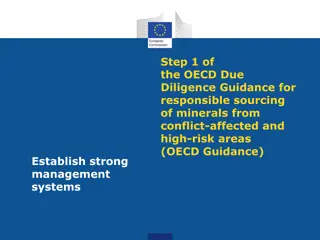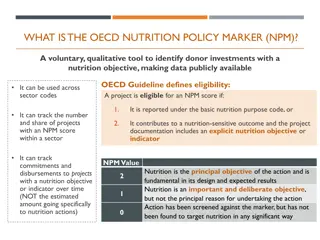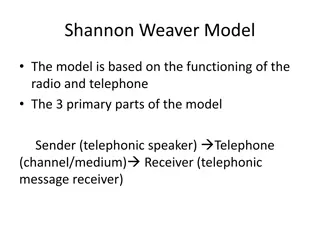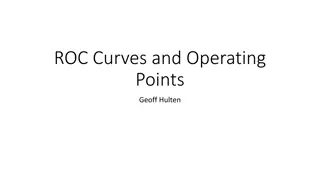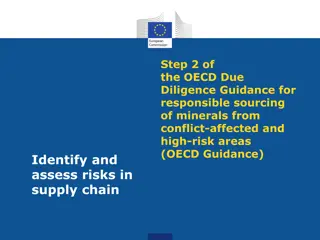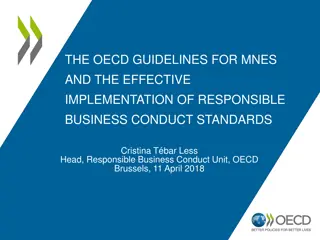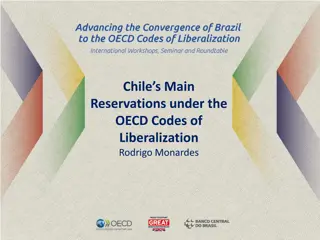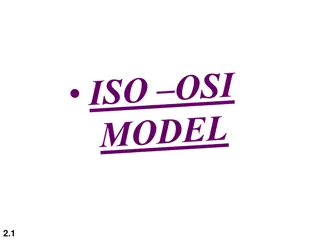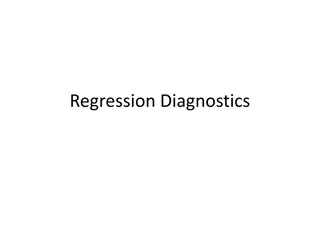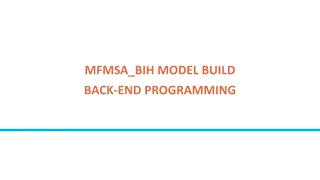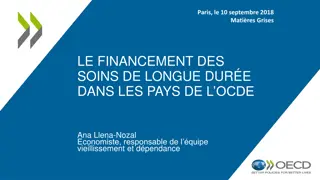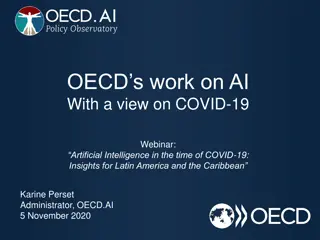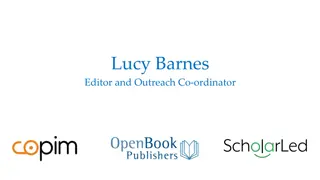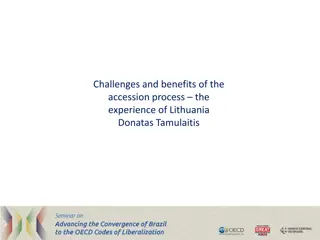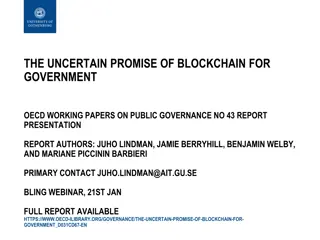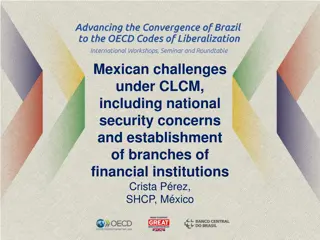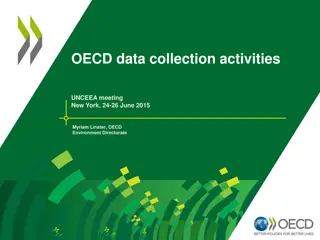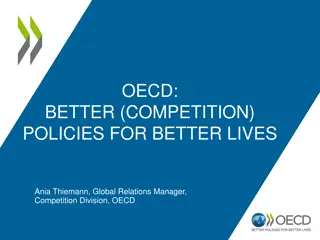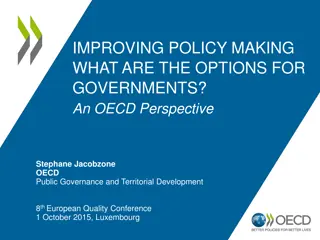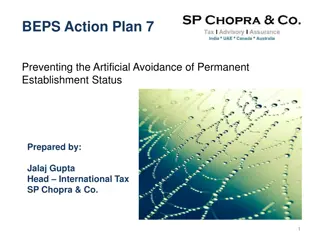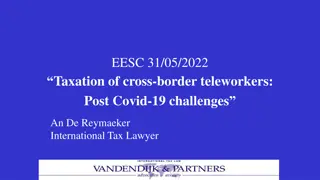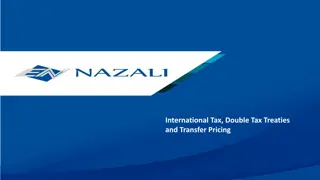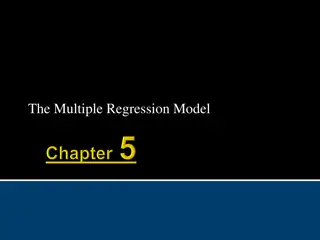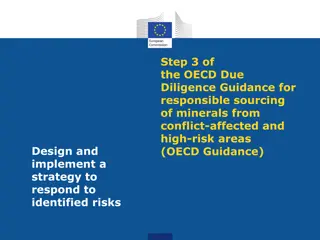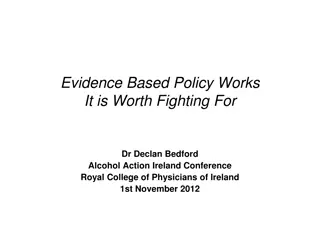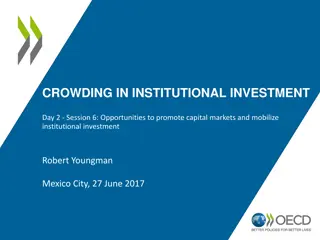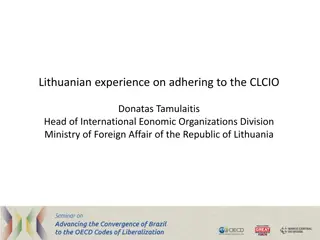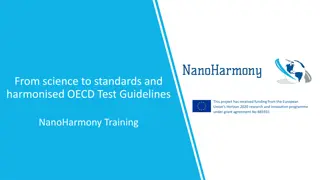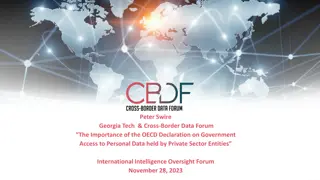Achieving Effective Delivery of Infrastructure Projects: Insights from OECD Seminar
Infrastructure investments play a crucial role in global development, but their successful delivery is becoming increasingly complex. Issues such as governance, ownership, and policy responsiveness can impact project outcomes. Without strategic management, projects may face challenges like inadequat
0 views • 24 slides
SUSTAINABLE WATER USE FOR GREEN HYDROGEN PRODUCTION: PRELIMINARY INSIGHTS FROM OECD WORK IN MONGOLIA
Preliminary insights from OECD work in Mongolia discuss the impact of green hydrogen production on water, sustainable approaches, and possible ways forward. The Sustainable Infrastructure Programme in Asia supports the transition towards net-zero infrastructure with a focus on enabling policies, pla
0 views • 14 slides
Challenges and Progress in Chilean Infrastructure Development
The challenges of Public-Private Partnerships (PPPs) in Chile within the framework of best practices and international standards are discussed, highlighting the need for long-term infrastructure planning and enhanced governance. The 2017 OECD Infrastructure Governance Review identified deficiencies
4 views • 40 slides
Building a Macrostructural Standalone Model for North Macedonia: Model Overview and Features
This project focuses on building a macrostructural standalone model for the economy of North Macedonia. The model layout includes a system overview, theory, functional forms, and features of the MFMSA_MKD. It covers various aspects such as the National Income Account, Fiscal Account, External Accoun
2 views • 23 slides
Challenges and Opportunities in Monitoring and Evaluation in OECD Countries
Monitoring and evaluation in OECD countries present unique challenges and opportunities, requiring clear mandates, ongoing processes, and robust institutional frameworks. The OECD approach emphasizes fostering quality, ensuring impact, and sharing lessons learned for efficient resource management. I
2 views • 12 slides
NAMI Family Support Group Model Overview
This content provides an insightful introduction to the NAMI family support group model, emphasizing the importance of having a structured model to guide facilitators and participants in achieving successful support group interactions. It highlights the need for a model to prevent negative group dyn
6 views • 23 slides
OECD Due Diligence Guidance: Establish Strong Management Systems
The OECD Due Diligence Guidance outlines the importance of establishing strong management systems for responsible sourcing of minerals from conflict-affected and high-risk areas. This involves adopting company policies, engaging with suppliers, implementing grievance mechanisms, and utilizing the 3P
0 views • 13 slides
Understanding the OECD Nutrition Policy Marker (NPM)
The OECD Nutrition Policy Marker (NPM) is a voluntary tool to identify donor investments with a nutrition objective. It helps mainstream nutrition in large-scale programs to improve outcomes and accountability. The NPM is applied at the project level to track investments and promote transparency in
1 views • 4 slides
Understanding Entity-Relationship Model in Database Systems
This article explores the Entity-Relationship (ER) model in database systems, covering topics like database design, ER model components, entities, attributes, key attributes, composite attributes, and multivalued attributes. The ER model provides a high-level data model to define data elements and r
0 views • 25 slides
Communication Models Overview
The Shannon-Weaver Model is based on the functioning of radio and telephone, with key parts being sender, channel, and receiver. It involves steps like information source, transmitter, channel, receiver, and destination. The model faces technical, semantic, and effectiveness problems. The Linear Mod
0 views • 8 slides
Understanding Atomic Structure: Electrons, Energy Levels, and Historical Models
The atomic model describes how electrons occupy energy levels or shells in an atom. These energy levels have specific capacities for electrons. The electronic structure of an atom is represented by numbers indicating electron distribution. Over time, scientists have developed atomic models based on
0 views • 5 slides
Understanding ROC Curves and Operating Points in Model Evaluation
In this informative content, Geoff Hulten discusses the significance of ROC curves and operating points in model evaluation. It emphasizes the importance of choosing the right model based on the costs of mistakes like in disease screening and spam filtering. The content explains how logistical regre
7 views • 11 slides
Responsible Sourcing in Conflict-Affected Areas: OECD Guidelines
The OECD Due Diligence Guidance outlines steps for companies to identify and assess risks in mineral supply chains from conflict-affected and high-risk areas. It explains Conflict-Affected and High-Risk Areas (CAHRAs) and the importance of due diligence in responsible mineral sourcing to avoid finan
4 views • 16 slides
OECD Guidelines for Responsible Business Conduct
The OECD Guidelines for Multinational Enterprises provide a framework for responsible business conduct, encouraging sustainable practices and minimizing negative impacts. The OECD's work on responsible business conduct focuses on enhancing economic and social well-being globally, emphasizing ethical
1 views • 30 slides
Chile's Financial Services Liberalization Overview
This content provides an in-depth look at Chile's main reservations under the OECD Codes of Liberalization, including its context of accession to OECD Free Trade Agreements and commitments to liberalization in services, investments, and financial services. It covers aspects such as cross-border trad
5 views • 20 slides
Understanding the OSI Model and Layered Tasks in Networking
The content highlights the OSI model and layered tasks in networking, explaining the functions of each layer in the OSI model such as Physical Layer, Data Link Layer, Network Layer, Transport Layer, Session Layer, Presentation Layer, and Application Layer. It also discusses the interaction between l
1 views • 41 slides
Regression Diagnostics for Model Evaluation
Regression diagnostics involve analyzing outlying observations, standardized residuals, model errors, and identifying influential cases to assess the quality of a regression model. This process helps in understanding the accuracy of the model predictions and identifying potential issues that may aff
1 views • 12 slides
OECD Expert Group on Disparities in National Accounts Work Summary
The OECD Expert Group on Disparities in National Accounts focuses on developing methodology to produce distributional results for household income, consumption, and saving. Their work involves adjusting national accounts totals, identifying relevant variables from micro data sources, imputing missin
0 views • 15 slides
MFMSA_BIH Model Build Process Overview
This detailed process outlines the steps involved in preparing, building, and debugging a back-end programming model known as MFMSA_BIH. It covers activities such as data preparation, model building, equation estimation, assumption making, model compilation, and front-end adjustment. The iterative p
0 views • 10 slides
Financing Long-Term Care in OECD Countries: Insights and Challenges
The funding of long-term care services in OECD countries poses significant financial and organizational challenges, with a growing proportion of the elderly population requiring such services. This article delves into the financing mechanisms, the public funding landscape, and potential reform pathw
0 views • 10 slides
Proposal for Radio Controlled Model Aircraft Site Development
To establish a working relationship for the development of a site suitable for radio-controlled model aircraft use, the proposal suggests local land ownership with oversight from a responsible agency. Collins Model Aviators is proposed as the host club, offering site owner liability insurance throug
0 views • 20 slides
OECD's Work on AI in Response to COVID-19: Insights for Latin America and the Caribbean
OECD is focusing on AI in the context of COVID-19, emphasizing the importance of trustworthy AI for societal benefits. The organization has outlined principles for implementing AI in policies, with a goal of fostering an ecosystem that prioritizes human rights, transparency, accountability, and more
0 views • 18 slides
UBU Performance Oversight Engagement Framework Overview
Providing an overview of the UBU Logic Model within the UBU Performance Oversight Engagement Framework, this session covers topics such as what a logic model is, best practice principles, getting started, components of the logic model, evidence & monitoring components, and next steps. The framework
0 views • 33 slides
Open Access Books and Library Membership: Enhancing Global Research Accessibility
Explore how Open Book Publishers (OBP) and EIFL collaborate to provide free access to scholarly resources for libraries in non-OECD countries, promoting global research accessibility. Discover the benefits of OBP's Library Membership Programme, offering discounts and comprehensive ebook access, revo
0 views • 20 slides
Challenges and Benefits of OECD Accession Process: Experience of Lithuania
The experience of Lithuania in the OECD accession process involves various objectives like national investment regime improvement, safeguarding measures, and coordination efforts with different ministries. Reservations and challenges in areas such as direct investment, real estate operations, and ba
0 views • 8 slides
The Uncertain Promise of Blockchain for Government - OECD Working Paper
This OECD working paper explores the potential impact of blockchain on government operations. Authored by Juho Lindman, Jamie Berryhill, Benjamin Welby, and Mariane Piccinin Barbieri, the report delves into the opportunities and challenges presented by blockchain technology in public governance. Juh
0 views • 19 slides
Challenges Faced by Mexico Under CLCM and Establishment of Financial Institutions
Mexico faced challenges related to national security concerns and the establishment of branches of financial institutions under the Codes of Liberalisation of Capital Movements (CLCM). The country's entry into the OECD in 1994 marked a significant period of liberalization and reforms, including exte
0 views • 13 slides
OECD Data Collection Activities Overview
OECD's data collection activities include interrelated work streams focusing on environmental data and indicators, database development, green growth, sectoral statistics, and regional analysis. The organization aims to provide comprehensive information to support policy-making and promote global co
0 views • 22 slides
Promoting Better Lives Through OECD's Competition Policies
The OECD's Competition Division works towards promoting fairer development, better education, healthcare, pensions, and employment through its outreach programs and global forums. The Global Forum on Competition engages participants from around the world to discuss topics like fighting corruption, p
0 views • 15 slides
Enhancing Policy Making: Options for Governments - An OECD Perspective
Various tools and approaches are discussed to improve policy making, including foresight, cost-benefit analysis, and regulatory tools. The changing context of policy challenges is highlighted, along with the OECD policy toolkit's modular approach. Strategies like talking to leaders, engaging stakeho
0 views • 20 slides
Understanding BEPS Action Plan 7: Preventing Artificial Avoidance of Permanent Establishment Status
The Action 7 Report aims to prevent artificial avoidance of Permanent Establishment (PE) status by making changes to the PE definition in the OECD Model Tax Convention. BEPS refers to tax planning strategies exploiting tax rule gaps to shift profits to low-tax locations. The OECD issued 15 action pl
0 views • 10 slides
Taxation Challenges for Cross-Border Teleworkers Post Covid-19
Challenges in international taxation arise for cross-border teleworkers post-Covid-19, especially regarding the taxation of income from employment under Article 15 of the OECD Model Tax Treaty. Issues such as physical presence, bilateral agreements during the pandemic, and future taxation scenarios
0 views • 7 slides
Understanding Permanent Establishments in International Taxation
Permanent establishments play a crucial role in determining tax liabilities for companies operating across borders. In Turkish corporate taxation, limited liability taxpayers are defined by their place of business and permanent representatives. The OECD Model Convention also provides guidelines on w
0 views • 18 slides
Principles of Econometrics: Multiple Regression Model Overview
Explore the key concepts of the Multiple Regression Model, including model specification, parameter estimation, hypothesis testing, and goodness-of-fit measurements. Assumptions and properties of the model are discussed, highlighting the relationship between variables and the econometric model. Vari
1 views • 31 slides
Responding to Risks in OECD Due Diligence Guidance
Develop and implement a strategic response to identified risks in accordance with the OECD Due Diligence Guidance for responsible sourcing of minerals. The process involves reporting findings to management, devising a risk management plan, implementing the plan, and assessing ongoing risks. Mitigati
0 views • 7 slides
Evidence-Based Policy in Road Safety: Insights from Alcohol Action Ireland Conference
Dr. Declan Bedford highlights the importance of evidence-based policy in road safety at the Alcohol Action Ireland Conference in 2012. The presentation covers the introduction of random breath testing, lowering legal alcohol limits for driving, and a public health advocacy model. Contextual data on
0 views • 32 slides
Opportunities to Mobilize Institutional Investment in Capital Markets
Aligning trillions of dollars managed by OECD institutional investors towards green infrastructure investments presents a significant opportunity. Currently, only a small percentage of large pension fund assets are directed towards infrastructure, with an even smaller fraction allocated to green pro
0 views • 4 slides
Lithuanian Journey Towards OECD Accession: Key Coordination Efforts
Lithuanian's experience in adhering to the CLCIO, coordinated by Donatas Tamulaitis, focuses on various processes including OECD accession, communication with Member states, management of recommendations, and more. The journey started in 2014 with the initial list of reservations and progressed thro
0 views • 14 slides
NanoHarmony Training: Standards and OECD Guidelines Overview
Delve into the world of standards and OECD Test Guidelines with the NanoHarmony Training material. Learn about harmonized test methods, the role of science in guideline development, engagement with OECD committees, and the process of creating OECD Test Guidelines. Explore how stakeholders can contri
0 views • 16 slides
Challenges and Importance of Government Access to Personal Data in Cross-Border Intelligence Oversight
Reflecting on the significance of the OECD Declaration on Government Access to Personal Data held by Private Sector Entities, this content delves into the drivers necessitating an OECD-type process, such as law enforcement needs, globalization of criminal evidence, and convergence of civilian commun
0 views • 8 slides






